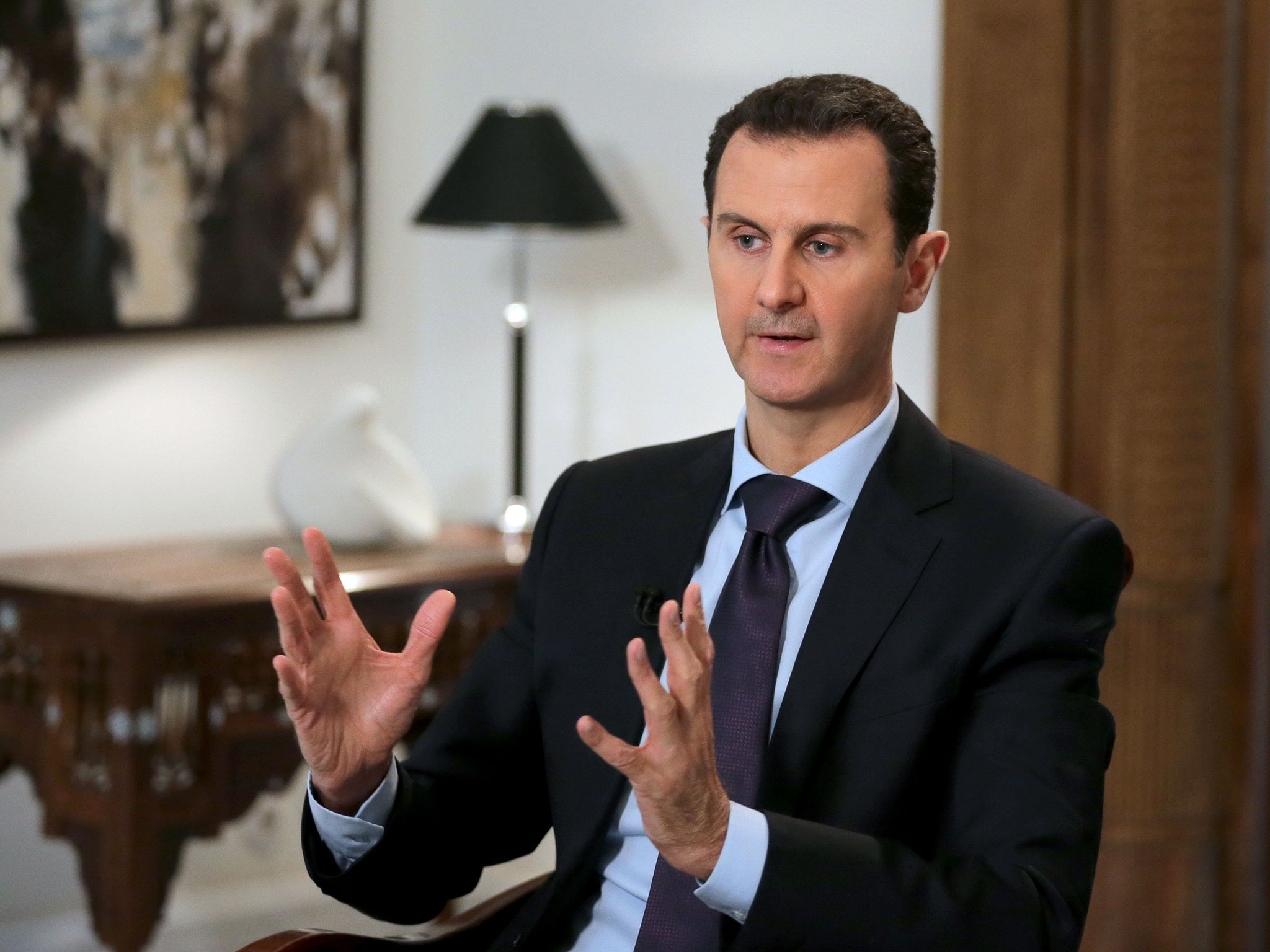Syria peace talks: Doubt cast over tentative deal as Assad claims he will retake country
Surprise agreement to halt fighting and allow humanitarian access already looks shaky, as it makes no mention of the Russian air strikes that are widely believed to be targeting anti-Assad rebel grops. Laura Pitel reports from Istanbul

Syrian president Bashar al-Assad has vowed to regain control over the whole of his country, casting doubt on a tentative international agreement to halt the fighting after almost five years of bloodshed.
In an interview with the AFP news agency in Damascus just hours before a surprise deal that also promised to grant sustained access to civilians in dire need of aid, he said that his troops would “without any hesitation” try to retake all territory lost to rebel groups.
He warned, however, the involvement of other regional powers in what has become an increasingly tangled proxy war “means that the solution will take a long time and will incur a heavy price”.
He said that his government “fully believed” in peace talks, but warned: “If we negotiate, it does not mean that we stop fighting terrorism.” Mr Assad has long sought to cast all those seeking to topple him as terrorists.
His remarks, made public only yesterday, will raise concerns about the prospects for peace after the agreement for a “cessation of hostilities” that is planned to take effect at the end of next week. If successfully implemented, it could represent a major breakthrough in a conflict that has claimed an estimated 470,000 lives and forced 11 million people from their homes.
However, the deal was met with deep scepticism from opposition fighters and activists, not least because it made no mention of Russian air strikes that have pummelled rebel-held areas for almost five months, helping President Assad to gain the upper hand.
In pictures: Russian air strikes in Syria
Show all 19Russian warplanes continued to bomb northern Syria on Friday, fuelling fears that Moscow and Damascus would use the week before the deadline to press on with key offensives. They include a major push around Aleppo, Syria’s second city, where rebels are all but encircled after pro-Assad forces succeeded in cutting their main supply line.
The agreement emerged after late-night talks at the Munich Security Conference between US Secretary of State John Kerry, Russian foreign minister Sergei Lavrov and over a dozen world powers.
Shortly after midnight on Thursday, Mr Kerry announced that they had struck a deal and would set up a UN task force to thrash out “the modalities for a long term and durable cessation of violence”.
The agreement stopped short of a full ceasefire because it was not signed by the main parties themselves – the Syrian government and the factions fighting against it. Mr Kerry cautioned that, if implemented, the deal would only achieve a “pause” in fighting and that more work would be needed to reach a full ceasefire.
The official opposition group formed to negotiate with the Assad government gave the deal a cautious welcome. Its spokesman, Salim al-Muslat, said that there must be visible impact before his group would resume peace talks in Switzerland, which were halted at the start of this month after just three days. “If we see action and implementation, we will see you very soon in Geneva,” he said.
The deal also promised to secure aid for civilians who have found themselves not only trapped in the middle of the fighting but also used as pawns. It set out plans for air drops and land deliveries to besieged areas – including a pro-government enclave surrounded by Isis in the eastern city of Deir al-Zour and the stricken town of Madaya, which has been under protracted siege by the Syrian army and fighters of the Lebanese militia, Hezbollah.
A major potential stumbling block will be which combatants should be demarcated as terrorist groups. Mr Lavrov said that Moscow would not stop its campaign of air strikes because the deal did not cover Isis, the jihadist group that holds territory across Syria and Iraq, or Jabhat al-Nusra, the al-Qaeda affiliate which fights alongside less hardline rebel groups across much of Syria.
Jan Egeland, the head of the Norwegian Refugee Council, hailed a provision to deliver aid to besieged civilians within days as a potential “breakthrough”.
But David Miliband, the former foreign secretary who now heads the charity International Rescue Committee, said: “You don’t wait a week for an emergency operation, and the people of Syria should not have to wait a week for relief from bombings.” He said that he would await further detail to see whether the agreement was “a turning point or a false dawn.”
The Kremlin insists that its aerial bombing has only ever targeted those two factions since it began in September. But the US and Britain say that most of Russia’s energies have been spent attacking other, non-Isis groups opposed to President Assad in order to help his troops make gains.
Subscribe to Independent Premium to bookmark this article
Want to bookmark your favourite articles and stories to read or reference later? Start your Independent Premium subscription today.

Join our commenting forum
Join thought-provoking conversations, follow other Independent readers and see their replies